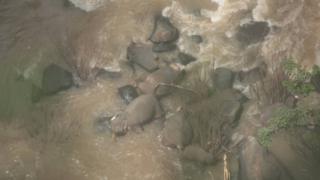 Image copyright
Image copyright
Thailand DNP
Some observers believe the herd fell while trying to help a baby elephant
The number of elephants that died after falling down a waterfall in Thailand has increased to 11.
It is thought the animals may have been trying to save a baby elephant that slipped over the edge.
Local authorities at the Khao Yai National Park in central Thailand initially spotted only six dead elephants over the weekend.
The additional five were spotted by drone near the notorious fall known as Haew Narok (Hell’s Fall).
The dead elephants included a three-year-old calf, park officials said at the weekend, according to the Reuters news agency.
“We understand that the elephants were trying to cross over to the other side of the river,” local official Badin Chansrikam told the agency.
“Probably, one of the smaller elephants might have slid and the adult ones were trying to rescue them but instead, were swept away by the water.”
According to local media though, the reason the animals fell into the strong current is not known.
When the first six dead animals were discovered at the weekend, two surviving elephants were found struggling on a rock.
Image copyright
Khao Yai National Park
Thai authorities shared an image of one survivor attempting to revive its companion
Park rangers lowered food laced with supplements to the stranded animals to help them regain strength and climb back into the forest.
But experts warn their long-term survival may be difficult as elephants rely on large herds for protection and finding food.
The incident could also take an emotional toll. Elephants have been known to display signs of grief.
There are around 300 wild elephants in the park, which is home to various wild animals, including bears and gibbons, and is a popular destination for tourists.
National park officers are trying to retrieve the bodies from the river as there are fears the carcasses might contaminate the water.
According to the Bangkok Post, the new death toll makes it one of the biggest losses to Thailand’s elephant population in recent memory.
The Haew Narok waterfall has a history of similar incidents. A herd of eight elephants died after falling in 1992, in a case that brought national attention.
Around 7,000 Asian elephants remain in Thailand, with more than half living in captivity.












